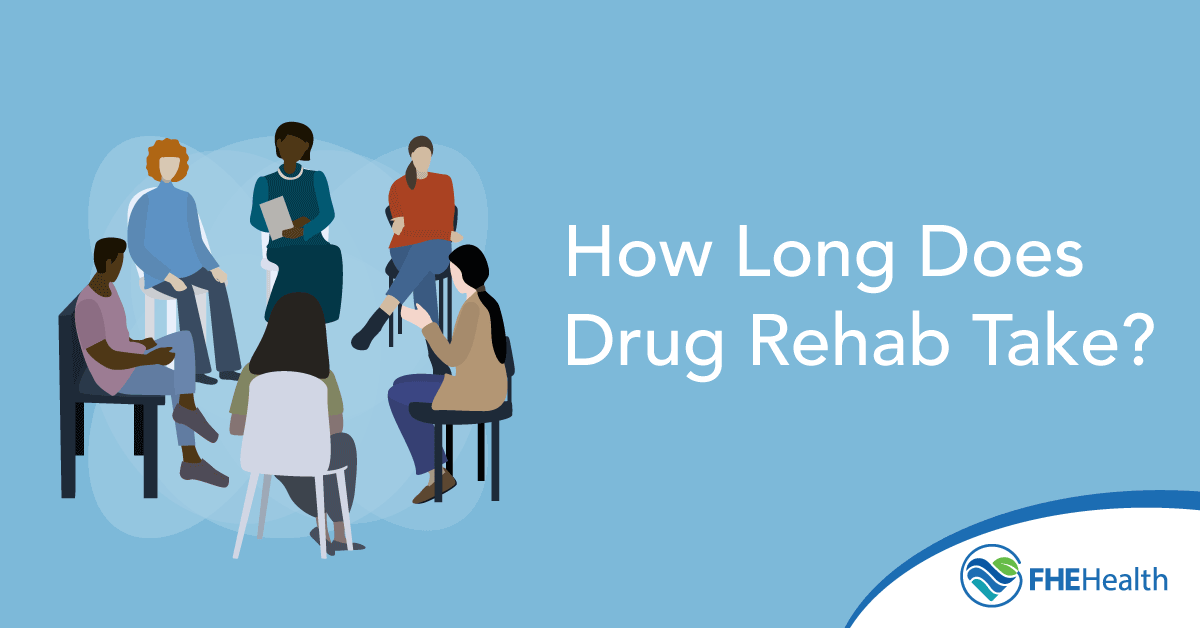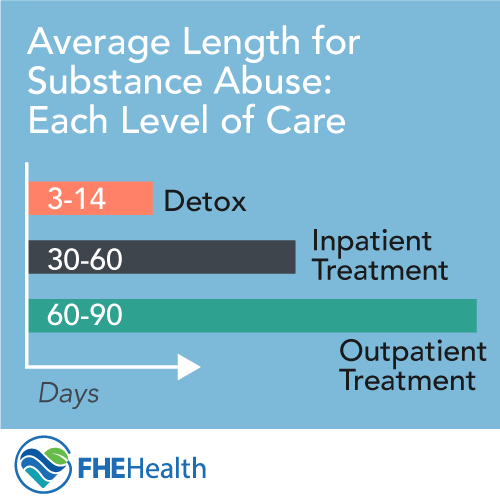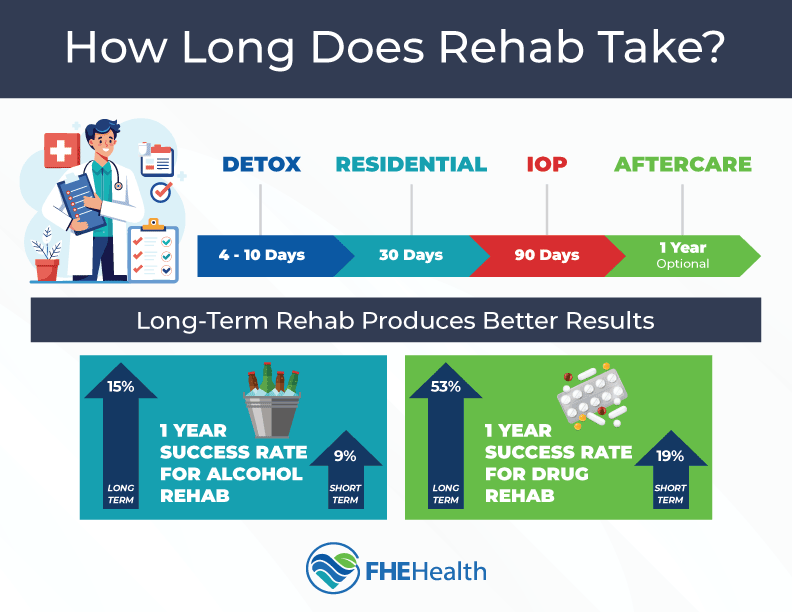
|
|
If you or a loved one needs care for an addiction or a mental health condition, you might be considering treatment at a rehab facility. With a busy life and schedule, the length of inpatient care is an important factor. So, how long is drug rehab going to last?
How Long Does Rehab Last?
How long drug rehab lasts depends on several factors. Although every person has different treatment needs, it’s possible to estimate the length of recovery care. In general, individuals spend:
- 3-14 days in a detox program
- 30-60 days in inpatient treatment
- 60-90 days in outpatient treatment
The type of program you choose influences how long rehab takes. You can also prepare beforehand to ease your transition and minimize disruption to your life. Here’s a closer look at the average length of time rehab programs last.
Detox
Detox is the first step of a treatment program when you discontinue the use of a substance under the supervision of medical providers who monitor your health. You use medications and other interventions to manage your withdrawal symptoms and help you remain safe and comfortable. The detox phase of treatment may last from a couple of days to a few weeks, depending on how quickly your body responds to ceasing substance use.
Inpatient Programs
With inpatient programs, you temporarily live at a treatment center and participate in group and individual therapy sessions and other activities. The length of time you spend in inpatient programs depends on individual needs, but most last 30, 60, or 90 days.
Outpatient Programs
In an outpatient program, you continue to live at home and attend therapy sessions a few days per week. Because you don’t receive daily care, these programs typically last longer than inpatient rehab. You may need to continue attending sessions for a few months.
Dual Diagnosis Programs
Dual-diagnosis programs combine inpatient or outpatient rehab treatment with treatment for a mental health disorder, such as depression, anxiety, bipolar disorder, or post-traumatic stress disorder. Because they often include additional therapy treatments and activities, dual-diagnosis programs may last additional days, weeks, or months compared to standard inpatient or outpatient rehab.
What Determines How Long Rehab Lasts?
Considering the approaches necessary for mental health and addiction programs, how long rehab is depends on factors such as:
- The type of treatment you need
- The severity of your addiction
- Whether you’re managing multiple conditions, such as addiction and a mental health disorder
- The amount of effort you put toward treatment
Longer treatment plans are generally associated with higher success rates. This means stronger addictions may need treatment for an extended period. Mental health rehab follows the same rules, with times determined by the type and severity of mental illness. In many cases, because mental health and addiction are often intertwined, it may be necessary to incorporate elements of both programs. This may also lengthen the treatment period.
More than any other factor, the length of your stay depends mostly on the effort you’re willing to put in. Even minor addictions or conditions take more time to address if you aren’t actively engaging in your program, and severe conditions can potentially be resolved in a shorter time with maximum effort. In short, you can influence the length of your program, but a longer time at rehab increases your chances for a full recovery.
What to Expect From Rehab
Your rehab experience is unique to your specific circumstances. What to expect depends on your needs. At FHE Health, we offer specialized treatments for mental health and addiction. Both programs have similar approaches, but the goals can be very different.
Mental Health Programs
According to the National Institute of Mental Health, mental illness affects almost 1 in 5 adults in the United States. Common mental illnesses, such as schizophrenia, depression, and bipolar disorder, can be difficult to navigate alone. For those who haven’t found relief with traditional therapy, a more comprehensive approach may be necessary. Our mental health rehab program offers professionals who can focus on your experience to build a treatment plan.
Treatment can include:
- Drug therapy
- Group and one-on-one counseling
- Behavioral modification training
The pressures of everyday life can sometimes make mental health struggles feel overwhelming. With this treatment, you can leave with the tools to continue recovery at home. An inpatient rehab program provides the opportunity to focus solely on managing your condition and improving your quality of life.
Addiction Programs
Almost 40.3 million U.S. residents over the age of 12 suffered from substance use disorder in 2020. Although there are varying levels of dependence, those who develop an addiction often can’t stop on their own. At any dependence level, our addiction programs at FHE Health can help you reclaim your life.
Addiction treatment requires a long-term approach, often involving several phases of recovery. After going through a medically managed detox, patients undergo intensive therapy to pinpoint the root cause of addiction. Underlying conditions are addressed, and recovery efforts focus on gradually reducing the need for inpatient treatment. Eventually, the addiction program should help you transition back to sober living outside the facility.
How to Prepare for Rehab
If you’ve made the decision to enter a rehab facility to treat a mental illness or addiction, a little preparation can ease the transition, regardless of how long rehab takes.
- If you live alone, arrange for someone to manage your home while you’re away.
- Depending on the length of your stay, you may need to pause utilities, mail, and subscriptions, and pets need a place to stay.
- Don’t forget to have someone water your plants; alternatively, you can simplify things by finding a trusted friend or family member to house-sit.
- If you’re employed, work out time off with your employer. Although you may be concerned about your employer understanding your situation, your recovery is the most important thing. Your employer is likely obligated to allow you extended time off for medical reasons.
- Check if you qualify for time off under the Family and Medical Leave Act. Your employer isn’t required to pay you under the FMLA but must hold your position until your return. The exception to this is if the company has a specific policy regarding ineligibility for employment due to substance abuse.
- Finally, gather your support system. You may not want to publicly announce your decision, but make sure your closest friends and family know where you’re going. You need people in your corner as you focus on your recovery. These are the people you’ll lean on most when you return to your normal life. Your support system can have a huge impact on your recovery, so choose carefully.
Taking the First Steps Toward Treatment
If you’ve been thinking about inpatient treatment for a mental health condition or addiction, contact us today. Our caring staff at FHE Health is here any time, day or night, to help you navigate your treatment options and take your life back by putting you on the best path to recovery.








